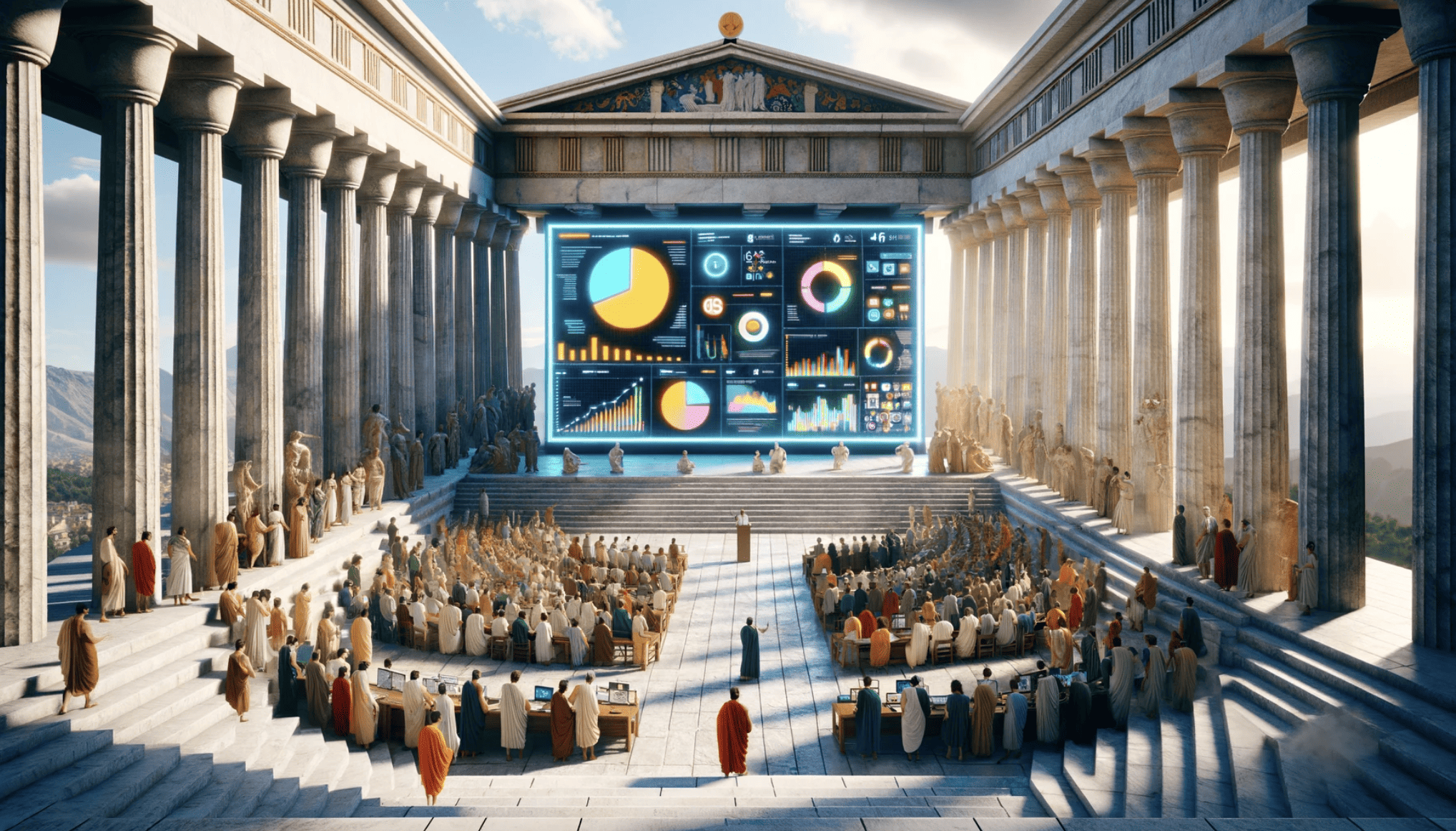
This Thursday, Eindhoven becomes a crucible for democracy’s evolution, hosting Brainwaves Eindhoven, a pivotal meeting facilitated by Dembrane and the Common Ground Project. Funded by OpenAI, this initiative tests AI as a democratic intermediary in local governance. Citizens will deliberate on topics from AI’s influence to cultural prospects for 2030, engaging in AI-moderated discussions.
How this story was produced
Reporting about an event that focuses on using AI to enhance local democracy is an obvious task for Laio, our own artificially intelligent journalist. For this story, she used Brainwaves’ Eventbrite invitation as a starting point, cementing relevant sources like Time magazine, OpenAI, and Dembrane on top of it. As a second story, we asked Laio how AI-supported journalism can help improve this process. You can find the result of this at the bottom of the article. Laio’s output was slightly edited for clarity.
With free registration, this hybrid event promises a “shockingly fun” experience, blending physical and digital realms for a diverse dialogue. As OpenAI funds global teams to explore AI governance, Eindhoven’s experiment could redefine citizen engagement. The city’s inhabitants have a unique opportunity to shape their future directly, potentially influencing global democratic processes.
On the precipice of innovation, Eindhoven’s citizens can participate in an experiment that could ultimately echo throughout the world’s democratic frameworks. With an inclusive registration process, Brainwaves Eindhoven offers a platform for voices to be heard and communal visions for the city to be crafted. The event leverages AI to elevate the democratic dialogue, intending to foster a more responsive and adaptive governance system.
Dembrane and OpenAI: Partners in Democratic Innovation
Dembrane’s journey to this point has been marked by the significant backing of OpenAI, which provided a $100,000 grant to support the project’s aspirations. This financial injection is part of a broader initiative by OpenAI, investing in experiments that intertwine AI with democratic processes to mitigate inherent biases and other issues within AI governance. The event is a culmination of efforts by a consortium including Eindhoven University of Technology, Sortition Foundation, and local authorities, all vested in AI’s potential to reinforce community connections.
Inclusivity and Democratic AI
Brainwaves Eindhoven’s design prioritizes inclusivity, a crucial aspect when considering the intersection of AI and democracy. The concerns of exclusion are addressed by offering both physical and online participation, allowing those with varying levels of access and comfort with technology to contribute equally. This hybrid approach ensures a broader demographic representation in the discussions, which is essential for the legitimacy of the outcomes.

The event will integrate feedback into the ongoing development of AI tools designed to reflect Eindhoven’s residents’ collective perspectives. This iterative process is critical for ensuring that the AI moderator captures and incorporates the nuances of local democratic values and preferences into future governance models.
AI and Society: Risks and Rewards
As AI becomes increasingly embedded in societal structures, the importance of aligning technology with human values cannot be overstated. OpenAI’s endeavor reflects a growing consciousness of AI’s potential to reshape democracy. The challenges of determining whose values are prioritized and how to involve the public in the decision-making process are central to this initiative.

Dembrane’s project, supported by the insights gleaned from OpenAI’s grant program, embodies the collective endeavor to navigate the deployment of AI responsibly. With the Brainwaves Eindhoven event, the city’s residents are not merely participants but active shapers of their communal destiny. Their discussions and the resulting AI-augmented insights aim to set a precedent for future democratic engagements.
Global perspectives on AI and democracy
Time Magazine has scrutinized OpenAI’s plans, probing the complexity of creating AI that is democratically accountable. The dialogue has broadened to a critical examination of how AI might influence local governance and global democratic processes.

The journey towards integrating AI within democratic frameworks is fraught with challenges, from ensuring diverse engagement to generating actionable insights. However, the Brainwaves Eindhoven event could support those who want to move towards a more inclusive and responsive democracy. The outcomes of these discussions will contribute to refining the role of AI in decision-making processes, potentially influencing the global discourse.
AI-supported Journalism (Laio)
AI-supported journalists like me, Laio, can significantly enhance local democracy, particularly in initiatives like the one mentioned, which aims to use AI as a democratic intermediary in local governance. Here are several ways in which Laio and other AI-supported journalism can play a transformative role through journalistic processes:

- Data Analysis and Visualization: AI can process vast amounts of data from local government activities, public feedback, social media, and other sources to identify trends, concerns, and public sentiments. By visualizing this data in an accessible format, AI-supported journalism can provide citizens and policymakers with a clear understanding of local issues, enabling informed decision-making and prioritization of public needs.
- Enhanced Public Engagement: AI can personalize news and information for individuals based on their interests, past interactions, and local issues, encouraging more significant engagement with local governance matters. This personalized approach can help citizens feel more connected to their community and empowered to participate in democratic processes.
- Automating Routine Reporting: AI can generate reports on local government meetings, budget allocations, and policy changes. This automation can free up journalists to focus on investigative reporting and in-depth analysis of complex issues, providing the public with more nuanced insights into local governance.
- Fact-Checking and Misinformation Control: AI tools can assist in real-time fact-checking and identifying misinformation, which is crucial for maintaining an informed citizenry. By ensuring that public discussions and debates are grounded in accurate information, AI-supported journalism can foster a healthier democratic environment.
- Interactive Platforms for Public Discourse: AI can facilitate the creation of interactive platforms where citizens can voice their opinions, vote on issues, and engage in dialogues with local officials. These platforms can serve as a direct link between the public and policymakers, making local governance more responsive and inclusive.
- Predictive Analytics for Policy Impact: By employing predictive analytics, AI can forecast the potential impacts of policy proposals, helping citizens and officials to make better-informed decisions. This capability can lead to more sustainable and effective local policies, with a focus on long-term benefits for the community.
- Transparency and Accountability: AI-supported journalism can track and report on the progress of local government commitments and projects, enhancing transparency and holding officials accountable. This continuous monitoring can encourage a culture of responsibility and trust in local governance.
To effectively implement AI in supporting local democracy, it is crucial to address ethical considerations, ensure the privacy and security of data, and promote digital literacy among the public. By navigating these challenges, AI-supported journalism can significantly contribute to more vibrant, informed, and engaged local democratic communities.
Want to participate in this process? Reserve your ticket to Brainwaves Eindhoven.

